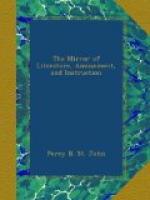“How could you, dear Lucy, volunteer such an avowal?”
“I thought you would be afraid of that; but it all did very well, for the mother said I was so amusing, had so much natural wit, and they all tried to persuade me I had said something clever.”
“Well, go on—and what then?”
“And then the lady took me aside, and began saying so much in praise of you; and when she once got me on that subject, I was ready and glib enough, I warrant you. But somehow, though I then found it so much easier to speak, I find it more difficult to recollect exactly what I said. Is not that strange? And then she said that my happiness would excite so much envy in the great world; that you had been admired, courted, nay, even loved by rich, noble, clever ladies. Why was all this? and how could you ever think to leave all these, to seek out from her quiet home your poor little Lucy?”
“Oh, that’s a story of by-gone days. These were follies of my youth, which I thought I had lived to repent.
“’Nor knew, till seated by
thy side,
My heart in all save hope the same.’”
“Why, save hope, my dear Lord? What may you not only hope, but trust, from my constant devotion?”
“I did not mean to tie myself precisely to every word I uttered. It was only a quotation.”
“And what is a quotation?”
“A quotation is the vehicle in which imagination posts forward, when she only hires her Pegasus from memory. Or sometimes it is only a quit-rent, which the intellectual cultivator, who farms an idea, pays to the original proprietor; or rather,”—(seeing that he was not making the matter more intelligible by his explanation,)—“or rather, it is when we convey our own thoughts by the means of the more perfect expressions of some favourite author.”
“But then, surely you need not be driven to borrow, whose own words always sound to me like a book. As for poor me, I wish I could talk in quotations for ever; then I need not fear to make these mistakes, which, as it is, I am afraid I am always like to do.”
(A scene at the Opera is richer still: the performance Semiramide:)
“Lady Gayland took the opportunity of inquiring of Lady Castleton, ’how the opera had amused her?’ There was that unmistakable air of real interest in Lady Gayland’s manner, whenever she addressed Lucy, which made her always reply in a tone of confidence, different from that which she felt towards any other member of the society in which she moved.
“Why, to tell the honest truth,” said she, leaning forwards towards her questioner, “I can’t say that I could the least understand what it all meant. It’s not likely that people should sing when they’re in such sorrow; and then I can’t guess why that young man should kill the queen that was so kind to him all along.”
“I don’t wonder that that should surprise you, my dear; but he was not aware of what he was doing. It was in the dark.”




